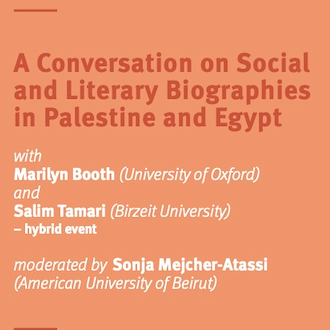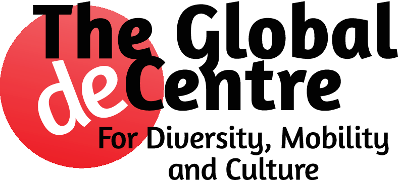
Plenary Session II: A Conversation on Social and Literary Biographies in Palestine and Egypt with Marilyn Booth and Salim Tamari
Second plenary session as part of the Summer School Moving Biography, all welcome
Friday, 3 June 2022, 5-6.30pm AUB, IFI Auditorium
Plenary session II (moderated by Sonja Mejcher-Atassi): A Conversation on Social and Literary Biographies in Palestine and Egypt with Marilyn Booth (Oxford) and Salim Tamari (Birzeit), hybrid.
Reflections on Biography
Marilyn Booth (University of Oxford)
In this conversation around approaches to biography writing in Arabic, and focusing on late-nineteenth-century Egypt and Ottoman Syria/Lebanon, this presentation will focus on questions of how one writes biography when there is scarce verifiable information on the subject, and how approaches to biography beyond a focus on the singular subject can help us to think about how we trace marginalized subjects—often, individuals who are marginalized in historical and literary study now, but were not ‘marginal’ in their own times. Booth will assess her own reasons for studying biography and autobiography throughout her career—both biography as an approach to historical scholarship, and biography as itself a genre of long historical importance and why it has been important to female, and feminist, writers.
Booth will bring into the discussion the importance of studying translation historically as a pathway into appreciating the work and the contributions of little-known intellectuals of another era (again, the late nineteenth century). This, too, raises questions of literary genre and signature in an individuals’ corpus, and how different genres (and genre-blurring, and authorial signature) were regarded then by peer intellectuals as part of an individual’s career, and how we treat them now. Where and how do ‘biography’, ‘intellectual history’, ‘media history’, and ‘imaginative writing’ intersect, and do these intersections allow a richer interdisciplinary understanding of not only individuals’ life experiences as constructed by them and others, but also of the historical canvasses which those lives helped to shape?
Short Biography: Marilyn Booth is Khalid bin Abdallah Al Saud Professor for the Study of the Contemporary Arab World, Faculty of Oriental Studies and Magdalen College, University of Oxford, and was a Fellow at l’Institut d’Etudes Avancées, Paris, February-April 2022. Her most recent monograph, The Career and Communities of Zaynab Fawwaz: Feminist Thinking in Fin-de-siècle Egypt (2021), is amongst numerous publications on early feminism and Arabophone women’s writing in Egypt and Ottoman Syria, and is her fourth research monograph, preceded by a book history of Fawwaz’s biographical dictionary of women (Classes of Ladies of Cloistered Spaces: Writing Feminist History through Biography in Fin-de-siècle Egypt (2015). Initiator of the Ottoman Translation Studies Group, she edited Migrating Texts: Circulating Translations around the Ottoman Mediterranean (2019) and is co-editing a second volume of the group’s work. She has translated eighteen published works of fiction and memoir from Arabic, including recently Hoda Barakat’s Voices of the Lost and Hassan Daoud’s No Road to Paradise. She was co-winner of the 2019 Man Booker International Prize for her translation of Jokha Alharthi’s Celestial Bodies, and her translation of Alharthi’s novel Bitter Orange Tree appears in May 2022.
Autobiographic Narratives and War
Salim Tamari (Birzeit University and Institute for Palestine Studies)
The Great War on the Eastern Front, looked at from the passage of one century, led to major transformations in the way in which the people of the region – from the Ottoman capital of Istanbul to the Arab provinces of the Empire – looked at themselves and at the world. What I propose to do is to see how the war and the fighting were reflected in the biographical trajectories of soldiers who fought in it and civilians who endured it, and how the war affected the transformation of their lives and the reshaping of their identity and affiliations during and after the war.
The war was so devastating that, according to contemporary accounts, it took a toll of one-sixth of the total population of greater Syria—one of the highest among all war fronts during that period. The victims, both civilians and combatants, perished from war, hunger, famine and diseases. Tens of thousands of civilians died as a result of the British naval blockade on food supplies coming into ports like Jaffa and Beirut, as well as from Ottoman governor’s Jamal Pasha’s sequestration of crops for the Fourth and Fifth Army Corps in Syria. The urban landscape was devastated in a way that recalls, under different circumstances a century later, the destruction that we witness today in Syria and Iraq. At the time, Greater Syria, that is the Ottoman provinces of Bilad ash-Sham, which included Palestine and Mount Lebanon, suffered the largest proportion of deaths of any region in the world, even when compared with Belgium, Britain, Germany and France.
In this presentation I will examine this great transformation through the lives of three civilians and three soldiers whose life trajectories marked the transition from Ottomanism to the new Middle East of Arab and Turkish nationalism. Those narratives were published in the form of diaries and memoirs, as well as in semi-fictional accounts. The writers include Khalil Sakakini, who kept a daily diary during the war in Jerusalem. His account is riveting in that it captured a vivid portrait for the desolation of the city in 1915 and1916, the famine years.
Muhammad Kurd Ali’s Damascene memoirs include his period as a publicist, some critics would say apologist, for the excesses of Jamal and Anwar (Enver) Pashas in Syria and Palestine. He was the chief organizer of two expeditions of Arab public figures and intellectuals to the Gallipoli and the Medina (in the Arabian Peninsula) to defend the war effort and bring the experience of the fighters to the general Arab public.
The most important fictional work to come out of the Great War in Arabic is The Life of Mifleh al Ghassani (1921) by the Palestinian writer and journalist, Najib Nassar. Subtitled “A Page from the Events of the Great War,” the novella is a thinly disguised autobiographical war memoir of the author, who spent 1916-1917 hiding from the Turkish gendarmes in the Bedouin encampments of the Jordan Valley, escaping possible execution on charges of being pro-British.
The second set of diaries and memoirs examined here are soldiers’ writings. Soldiers’ narratives of the war were rarer, in large part because literacy was limited, but also because soldiers’ diaries did not survive the toll of exile, trench warfare, and fear of discovery. Here I will examine the narratives of three soldiers’ diaries that reached us against the odds. They allow us to examine how these events had an impact on the lives of three Ottoman (Arab and Turkish) soldiers. Their narratives are doubly significant because, contrary to popular assumptions about the war, the manner in which the war affected their consciousness did not always correspond to their ethnic background.
The biographic trajectories of the three soldiers suggest several responses by soldiers to their experience of war: rethinking and reinvention of identity (Muhammad Fasih); separatist nationalism (Aref Shehadeh); and pacifism (Ihsan al-Turjman). I will make two conclusions from this discussion. First, the reconstruction of identity experienced in the Great War is ephemeral. Self-conceptions transform themselves through ruptures at a very fast rate during times of war, because the war disrupts the tempo of the daily routine. It compels us to rethink where we were and where we are heading in the immediate future. The second conclusion is that, when people are faced with devastation, they tend to revert to the comfort and security of local identity–because it is protective and familiar and allows people to insulate themselves from the seeming impending collapse of the world around them.
Short Biography: Professor of Sociology (Emeritus), Birzeit University; Research Associate, Institute for Palestine Studies; Editor, The Jerusalem Quarterly.
Recent Publications: Mountain Against the Sea: A Conflicted Modernity; The Storyteller of Jerusalem: The Life and Times of Wasif Jawhariyyeh (with Issam Nassar); Year of the Locust: Erasure of the Ottoman Era in Palestine; The Great War and the Remaking of Palestine (2018: UC Press); Landed Property and Public Endowments in Jerusalem(with Munir Fakhr Ed Din, 2018). Camera Palestina: Photography and the Sensual Impulse (UC Press; forthcoming 2019).
Ph.D. Sociology, Manchester University; Visiting Professor: Ca Foscari University (Venice); Georgetown University (Washington); New York University; Cornell University (Ithaca); University of Chicago; Harvard University (Cambridge); Columbia University (New York).
Rewards:
2018: Middle East Monitor prize for the Great War and the Remaking of Palestine
2017: State of Palestine Prize for Lifetime Achievements in the social sciences and humanities.

